
![]()
Introduction
The visit of 1845
The sequel
Selected letters of Berlioz
Marseille in pictures
This page is also available in French
All translations of Berlioz’s writings on this page are © Michel Austin.
![]()
Berlioz’s first known visit to Marseille dates from early in 1831, when he was on his way to Italy as winner of the Prix de Rome of 1830: because of the season he decided to avoid the crossing of the Alps in winter and travel instead by sea from Marseille (Memoirs, ch. 32). He travelled from La Côte-Saint-André via Lyon, where he was briefly on 9 February (CG nos. 208, 209), then from Lyon to Marseille by stagecoach which he reached four days later (CG no. 210). The letter he wrote to his sister Adèle from Marseille on 13 February (CG no. 210) gives a brief contemporary record of his passage there. At this time Marseille was for him no more than a stage in his journey, and though he managed to hear on the way some music at the theatre, for several years after his return to Paris from Italy in 1832 the city did not feature on his musical horizon (unlike Lyon where as early as 1833 he considered giving a concert).
His view of Marseille began to change in the late 1830s, and this is probably to be associated with a new friendship that was to play a significant part in his career. In 1836 the young Auguste Morel, then still in his twenties, came to Paris from his native Marseille to pursue his career there, much as Berlioz, a provincial himself, had come from La Côte-Saint-André to the capital city in 1821. The two men had a great deal in common, as practising musicians, composers, and writers on music. When exactly they first met is not clear, but at any rate they were on close terms by 1838 (cf. CG nos. 573bis [vol. VIII], 604), and remained subsequently life-long friends. The history of their personal relations is traced in detail on a separate page. One result of their meeting was that Morel introduced Berlioz to his own circle of friends in Marseille, prominent among whom was Hippolyte Lecourt, a lawyer who was also a versatile amateur musician. Already before the end of 1838 there was talk of an invitation to Berlioz to conduct in Marseille (CG no. 612). Paganini, who in December of that year had paid public homage to Berlioz and given him 20,000 francs, was resident at the time in Marseille and in contact with Berlioz (cf. CG nos. 653, 699); he urged him to come and give concerts there, but Berlioz was not at the time free to follow this up (CG nos. 632, 635). It was a source of a great sadness for Berlioz that Paganini was unable to come to Paris to hear the first performances in November and December 1839 of the symphony (Roméo et Juliette) which had been composed thanks to his gift and was dedicated to him (CG no. 666), and he died the following year in Nice. In the meantime Lecourt was active in promoting the cause of Berlioz in Marseille: he helped to organise a performance of the King Lear overture early in 1840 (CG no. 712), and in December 1843 a performance of the Chant Sacré which Berlioz had orchestrated in response to a commission from Marseille (CG no. 867). Up to this point Berlioz’s musical travels had taken him to Germany (1842-3), not to other cities in France. During his stay in Nice in September 1844 Berlioz may have toyed with the idea of a concert in Marseille, though nothing happened (CG III p. 200 n. 2). On his return to Paris in the autumn of 1844 Berlioz was in correspondence with a lawyer and amateur musician from Châlons-sur-Saône, Buy-Fournier, about his possible participation in a music festival there (CG nos. 922, 939, 956, 976). In the end nothing came of this, though the idea lingered on till 1846 (CG no. 1043). Then around May 1845 Berlioz was approached by the director of the theatre in Marseille with a concrete proposal to come and give two concerts there, and this time he accepted (CG no. 966). Coincidentally or not, Liszt had recently been honoured with a festival in Marseille, on which Berlioz reported in one of his feuilletons (Journal des Débats, 17 May 1845, p. 2; Critique Musicale VI, pp. 82-4 [hereafter CM]).
![]()
Relatively little is known of what turned out to be Berlioz’s only concert visit to Marseille. Hardly any letters survive from the time of his stay in the city (CG nos. 970, 971), and subsequent letters provide only a few hints. There is also a short near-contemporary report written not long after Berlioz’s visit to the city. A detailed account of the trip was written by Berlioz a few years later, in 1848, together with accounts of his trips to Lyon in July 1845 and Lille in June 1846. As will be seen below, the account is deliberately light-hearted or even flippant in tone, and seems to blur intentionally the details of the visit, as though Berlioz did not want to play up its significance. This is in contrast to the series of letters which he wrote and published after his two trips to Germany and central Europe in 1842-3 and 1845-6, which were prominently included in his posthumous Memoirs, as was the trip to Russia of 1847.
The earliest mention of the projected trip occurs in a letter dated 4 June (CG no. 966). Two days later, shortly before his departure, Berlioz wrote separately to his two sisters Nancy (CG no. 968) and Adèle (CG no. 969), but strikingly he failed to mention to either of them that he was on the point of departing for Marseille; instead he mentioned a projected trip to Bordeaux (which in the event did not take place). Yet a visit to La Côte on the way to Marseille would have been feasible (cf. CG no. 612). One reason for his reticence may be that he wanted to avoid raising hopes of a family reunion, which Nancy was apparently pressing on him (CG no. 968). He did eventually make the trip to La Côte in July from Lyon, but it seems that the idea of giving concerts in Lyon only developed during his stay in Marseille in June; the visit to La Côte was thus an afterthought and a by-product of his stay in Lyon. Another reason for his initial reticence may have been the anticipated presence of Marie Recio on the trip: she accompanied Berlioz to Marseille and then to Lyon, as can be deduced from references in Berlioz’s letters (cf. CG no. 993 for Marseille, nos. 981, 987, 996 for Lyon), though the fact was not mentioned by him in his later accounts of his trips there. She now openly presented herself as Mme Berlioz, as she was to do in Berlioz’s second trip to Germany in 1845-6.
There is no record of the journey itself from Paris to Marseille. The bulk of it cannot have been made by train, since it was to be over a decade (1857) before Paris and Marseille were completely linked by rail: the development of railways in France lagged behind that of Germany (on what follows see Mathieu-Georges May, L’Histoire du chemin de fer de Paris à Marseille in Revue de géographie alpine, XIX no. 2 [1931], pp. 473-93). The rail link between Paris and Lyon was only completed in 1856. As late as 1849 travel from Paris to Lyon took nearly two days, and involved a series of changes: from Paris to Tonnerre by rail (5 hours), then overnight by stagecoach to Dijon (about 8 hours), then by train again from Dijon to Châlon (2 hours), and finally a steamer took the passengers down the Saône river to reach Lyon in the evening of the second day (12 hours). Travel south of Lyon to Marseille in 1845 meant going down the river Rhône as far as Avignon, either by steamer or by stagecoach, then by stagecoach from Avignon to Marseille: there was no rail link at the time for any section of the route from Lyon to Marseille. In February 1831 Berlioz took four days to get from Lyon to Marseille (CG no. 210). In June 1845, the whole journey from Paris to Marseille must have taken Berlioz and Marie Recio the best part of a week and involved much overnight travel. It is not known where they stayed in Marseille.
Berlioz gave two concerts in Marseille, on 19 and 25 June, with probably identical programmes, in which his own music figured prominently. They took place in the Grand Théâtre. Rehearsals were arduous, as a letter shortly after his departure from Marseille implies (CG no. 972), though he had the support of his friend Lecourt. There were capable players in the orchestra, such as the leader Pascal (CG no. 1357), the German oboist Wacker whom Berlioz immediately recommended to Liszt (CG no. 970 [see vol. VIII]) and Mendelssohn (CG no. 971), the excellent bass singer Alizard whom Berlioz had supported from the start of his career (cf. CG nos. 977, 993), and the participation of the Trotebas Society, a well-established academy of male singers in Marseille. But the success of the concerts may have fallen short of expectations (cf. CG no. 972): Berlioz estimated the audience at the first concert at about 800, and it is likely that it was smaller at the second concert (as happened the following month in Lyon). The earliest account of the concerts, as mentioned earlier, is a short report in the Journal des Débats in Paris on 9 July 1845 (p. 2). The account is unsigned, but was probably written by Berlioz himself and inserted at his request:
M. Berlioz has just given two brilliant concerts in Marseille. The works which made the greatest impression were especially Le Cinq Mai, outstandingly sung by Alizard, the Hymne à la France and the apotheosis of his Symphonie triomphale. After the first concert, the eighty choristers of the Trotebas Society, who had performed the great choruses of the programme with remarkable ensemble and warmth, came to serenade Berlioz under his window, which attracted a huge crowd.
The full account was written up by Berlioz three years later; it is dated 14 July 1848, and must therefore have been written during Berlioz’s first stay in London. It appeared in the Revue et gazette musicale on 10 September of that year [CM VI pp. 399-408], and was later reproduced by Berlioz in his Grotesques de la musique in 1859, though with a number of cuts. It is worth quoting at length from this, the only detailed account of Berlioz’s stay in Marseille in 1845:
[…] I had just given four festival matinée concerts in the Cirque des Champs-Élysées, and I felt that the baths and the distractions which had revived me the previous year after the Festival de l’Industrie, would again be of great benefit to me [an allusion to his stay in Nice in September and early October 1844]. As soon as I formed this conviction, I took my hat… and I went for a swim… in Marseille.
After a good swim in the Mediterranean, I felt a desire to acquaint myself with the city, and the first person who came to mind was the most knowledgeable music-lover of the Phocaean city, one of my old friends, M. Lecourt. He plays the cello very well, knows the whole of Beethoven by heart, and a few years ago travelled 150 leagues to hear the first performance of one of my works in Paris [perhaps the Symphonie funèbre et triomphale in July 1840]. He is inflexible in his convictions, says straight what he thinks, calls everything by its name, writes as he speaks, thinks, speaks, writes and plays in tune, and has a heart of gold. I had no difficulty in finding out where he lives; it would have been more difficult to find someone in Marseille who did not know him. When he saw me he said:
« — It’s you! Hello! Who the devil gave you the idea of coming to Marseille to perform music? At such a time of the year, in this heat, with all the coffee and indigo that arrives daily in the harbour? You must be mad!
— Well, it is the director of your theatre who suggested this good idea. In ten days we are giving a concert.
— This is extravagant!
— We are giving two concerts! And if you push me further, we will give three, and you will play a cello solo at the fourth!
[…] Marseille is the first city in France to have understood Beethoven’s great works. It was five years ahead of Paris in this respect; Beethoven’s last quartets were being played and admired in Marseille when we in Paris were still calling the sublime author of these extraordinary compositions a madman. I therefore had good reason to believe in the capability of a number of performers and the intelligence of some members of the public. Besides there are in Marseille several virtuoso players whose support I was hoping for, and which they did indeed provide. The theatre also had at that time a capable company of singers, among whom I had noted the names of Alizard, Mlle Mainvielle Fodor and two Italian sopranos whose name were often favourably mentioned to me.
With the help of M. Pépin, the capable conductor of the theatre orchestra, of M. Pascal the leader of the orchestra, and M. Lecourt, who in spite of his views on the inappropriate timing of the undertaking, nevertheless helped me to make it a success, I soon assembled my instrumental forces. We were short only of trumpets, as the habit had spread at that time in the largest provincial orchestras to play the trumpet parts on cornets, a deplorable practice which should not be tolerated under any circumstances. I had heard only lukewarm praise for the theatre’s chorus, but on the other had I had heard of the reputation of the Trotebas Society, an academy of male singers which has not been wrecked by the recent death of its founder; they came to my assistance with good grace and submitted to very long rehearsals with great care and patience. This society, which is justly renowned in the south of France, consists of 60 members; they may not be good sight-readers, but are gifted with remarkable musical instincts, and clear, sonorous voices of fine timbre. These gentlemen performed several pieces with verve and a feeling for nuance that deserves the highest praise. As for the soprani, who belonged to the theatre chorus, I was obliged during the concert, and to put an end to their wailings, to tell them before they started a piece where they only double the tenors an octave above: « Ladies, there is a copying error in your voice parts: at the start there are 300 silent bars that are missing; count them carefully and in silence. » It goes without saying that the piece was over before the 300th bar, and that these ladies therefore did not spoil anything. Among the singers Alizard stood out as the most distinguished.
There were approximately 800 people in the audience; but Méry was there, which for me raised the number of those present with intelligence and taste to at least 2000. The audience was attentive and often very warm; but some parts of the programme nevertheless caused, as is always the case in France, very heated discussion after the concert. […]
Berlioz says nothing of the second concert, and instead of giving an account of the music included in the programme he relates at length the gossip of the crowds after the first concert, as told to him by a Marseille cab driver… From this it emerges that in addition to the works mentioned in the Débats report excerpts were also played from Harold in Italy (2nd movement) and the Symphonie fantastique (3rd movement), and other music may have been played as well.
Berlioz left Marseille not later than 1 July: on the 2nd he was in Avignon on his way to Lyon, with the intention of giving a concert there which he had started planning during his stay in Marseille (CG no. 972).
![]()
In the event Berlioz never returned to Marseille. His experiences there in 1845 probably confirmed him in his view that France’s provincial cities could not compete musically with Paris; for Berlioz travel abroad, to Germany, Central Europe, Russia, or London, was far important and rewarding than travel in France outside Paris. Already in 1837 he had noted that an attempt to perform his Francs-Juges overture in Marseille had been a failure (CG no. 493). A letter of 1842 to his sister Nancy implies a critical estimate of Marseille’s musical capacities (CG no. 771). In 1853 when asked to have his opera Benvenuto Cellini staged there he declined, as he was not convinced that Marseille had the necessary resources (CG no. 1619; he does not specify who made the suggestion – Morel himself?). When his friend Auguste Morel eventually moved from Paris to Marseille in 1850, Berlioz could not help saying to Morel himself and to Lecourt that Morel’s place was really in Paris, the musical capital (CG nos. 1357, 1399, 1496). He had already made a similar suggestion to the singer Alizard in 1845 (CG no. 993). When in April 1857 Morel proposed to perform the second movement of Roméo et Juliette Berlioz questioned whether the orchestra in Marseille was adequate for the task (CG no. 2225).
Berlioz was noticeably slow in writing up the account of his visits to Marseille and Lyon in 1845, and to Lille the following year. In comparison, after his first visit to Germany in 1842-3, he wrote and published without delay a series of ten letters recounting the journey in great detail. In August 1845, only weeks after his trips to Marseille and Lyon, he similarly lost no time in writing an account of his visit to Bonn for the Beethoven celebrations, which he completed even before returning to Paris, and published immediately on his return. But it was only during his stay in London in the first half of 1848, at a time when he needed to earn money through his writings, that he started to write up the French trips.
Though he did not return to Marseille, Berlioz did keep informed of musical activities there through his friends on the spot, and reported them from time to time in his feuilletons in the Journal des Débats (9 February and 26 July 1853; 25 November 1854; 24 September and 19 December 1856; 17 February 1858; 16 February, 2 June, 20 October and 24 November 1860). He would write recommendations for leading artists who went to perform in Marseille (CG nos. 1428 [Mme Charton-Demeur], 2421 [Mme Meillet]). Above all, he kept in regular contact with Marseille through a number of friends there, two of whom were particularly close to him, Hippolyte Lecourt, and especially Auguste Morel; Lecourt and Morel helped him in many ways, not least with the early stages of his son Louis’ career in the navy. His relations with these and other friends from Marseille form the subject of a separate page on this site.
![]()
A number of letters concerning Berlioz and his relations with Marseille are reproduced on the page Berlioz and Marseille: friends and acquaintances. Only those directly relevant to the subject of this page are reproduced here.
To his sister Adèle (CG no. 210; 13 February, from Marseille):
[…] I left the day after I arrived in Lyon. As the steamer was going to take longer than usual over the journey because of overnight stops in Valence and in Avignon, I preferred to go by stagecoach but this dragged the journey out over four days.
I will leave tomorrow evening if the captain keeps his word, though I cannot count on that. I will only be sailing as far as Leghorn, and from there I will easily proceed to Rome by land or by sea. […]
I found here numerous acquaintances from the Paris Conservatoire; I was immediately given tickets to the Grand Théâtre, without which I would have been at a loss how to spend the evening. A few musicians in the orchestra who had played in my last concert recognised me; my music has been the subject of conversation here, I was much fêted, and it was a remarkable coincidence.
Marseille is superb, and without the dreadful confusion in my mind I would have been lost in admiration. […]
To Humbert Ferrand (CG no. 493; 11 April, from Paris):
[…] The overture to Les Francs-Juges has just been performed with enormous success in Leipzig; in France the work was equally successful, in Lille, Douai and Dijon. On the other hand the musicians of London and Marseille were unable to master the piece after several rehearsals and gave up. […]
To Édouard Rocher in La Côte (CG no. 612; 28 December, from Paris):
[…] I may go to Germany if I recover sufficiently, or also to Marseille where I am invited for a fortnight. These negotiations are not yet concluded; should I go to Marseille we would see each other on the way. […]
To Hippolyte Lecourt (CG no. 632; 28 February, from Paris):
Give me news of Paganini; I wrote to him a month ago and have not received any reply. […] Morel is as always an excellent friend; I see him often and we always talk a great deal about you. […]
Were you responsible for the article on the concerts in Marseille which appeared in the Gazette Musicale? […]
To his sister Adèle (CG no. 635; 1 March, from Paris):
[…] Paganini has just written to me to urge me very strongly to come to Marseille where he has organised two concerts for me. I am obliged to tell him in reply that I will not go. It would be the height of folly. You know nothing and cannot have any idea of the thousand difficulties and dangers of my position. […]
To Hippolyte Lecourt (CG no. 666; 23 September, from Paris):
I only have time to write you a few lines to thank you for your kindness. Your two scores gave me the greatest pleasure. Please thank also M. de Rémusat for the trouble he took in copying out for me this immense and magnificent overture by Beethoven. […]
If you were here you would be a fine double-bass, and Morel would play the viola. But now you are married and probably travel a good deal less; I will also have the heart-break of not having the presence of Paganini to encourage me. If he is still in Marseille, please go to see him for me; speak to him in the most affectionate terms you can think of, and pass on to him my most ardent wishes for his speedy recovery; I am frightened of boring him with my letters. Tell me where he will be going when he leaves Marseille, so that I can tell him in due course how my work is being received. I will send him the libretto when it is printed, until I can send him the full score. From the words he will be able to form a reasonable idea of the general plan of the work. You will be receiving a copy of the libretto as well. […]
If your violins are worried about the high As, I implore you not to let them massacre my overture to Benvenuto: I would notice it even from here where I am. I will give it in my second concert, to give the others some idea of how it should be played and what it says when it is made to speak as it should. […]
To Hippolyte Lecourt (CG no. 712; 19 April, from Paris):
I thank you thirty-seven million times for everything you have done for this great and wild overture! [King Lear] Say to the gentlemen of the orchestra, professionals and amateurs, and especially to the conductor, how grateful I am for the care and patience they displayed in studying it. It is extremely difficult; and when you give it again do as I did for Romeo and Juliet […] [Berlioz gives detailed advice about sectional rehearsals] […] That is the only way to perform contemporary music.
Your article is fiery, explosive and incandescent! Thank you again.
Morel is writing to you, M. Double is writing to you, I am writing to you; I am sending you these letters all together. […]
Victrix causa deis placuit, sed victa Catoni! [The victorious cause found favour with the gods, that of the defeated with Cato]
That is what you are thinking, or at least what you are saying. And I am confident that you say to me what you think.
To his sister Nancy (CG no. 771; 5 July, from Paris):
[…] I have a very clear idea of the kind of religious music you endured in the Phocaean city [Marseille], which nevertheless takes great pride in its feeling for harmony. Besides your musical education was incomplete and you probably did not know already that classical religious music, for uncultured minds such as our own, is the ultimate in anti-religious crudeness. There are hundreds of pieces by great masters which, even if well performed, would be as beautiful (or as ugly) for you and me as the fugue of your Gentleman from Marseille. […]
To Hippolyte Lecourt (CG no. 867; 21 November, from Paris):
[…] Now here is the Chant Sacré which they asked me in Marseille for a concert which you are apparently giving next month. I orchestrated this as best I could; it is very easy. You will only lack bass clarinets, but they are optional; but just make sure that the horn in C does not play a B flat where I have written stopped B naturals, and that the stroke on the bass drum at the end is not played forte but with restraint, just slightly louder than the previous piano.
If you have 150 singers available, as I am told, you should distribute them as follows:
25 first sopranos and 25 second
25 first tenors and 25 second
25 first basses and 25 second
and double, if possible, flutes, oboes, clarinets and bassoons.
Farewell. Give my apologies to the person who honoured me in writing to ask me to orchestrate this piece; I cannot reply to him, I have lost his letter and do not remember his name.
A thousand greetings.
Tell me about the piece after its performance and return the score to me as soon as possible, though only after making a copy of it. […]
Give also instructions to the two timpani players not to use wooden sticks, which would produce a disastrous effect here, but rather sticks with sponge heads, which they must have.
To P.-J. Hetzel (CG no. 966; 4 June, from Paris):
[…] My apologies for keeping you waiting a little longer for this damned article about the Conservatoire. I have received a rather attractive offer from the director of the Marseille theatre and this obliges me to absent myself for a few weeks. During this time the rehearsals and preparations for my concerts will leave me very little free time, so it will only be on my return that I will be able to deal with this little job, for which I have incidentally already gathered a few notes. […]
To his sister Nancy (CG no. 968; 6 June, from Paris):
[…] You are hurting me with your talk of a family reunion and for raising the possibility that I might not be keen to go. I have no freedom, no leisure, no means, I am constantly at work. Like you I am deeply saddened by our father’s isolation, but fortunately he likes this isolation and we are wrong to feel sorry for him. I even believe he prefers it to the social relations that others seek. There is a great deal of weariness, disdain and discouragement in his attitude. […]
One of these days I will be making a small trip to Bordeaux where I have hopes of organising a few lucrative concerts. I will write to you on my return. […]
To Felix Mendelssohn in Leipzig (CG no. 971; 29 June, from Marseille):
[…] M. Wacker plays the oboe and the cor anglais very well, and he is also an excellent musician; a German by birth he wishes to go back to his native country. I very recently appreciated all his musical worth in my concerts in Marseille. […]
![]()
Unless otherwise stated all the pictures on this page have been scanned from engravings, postcards and other publications in our collection. © Monir Tayeb and Michel Austin. All rights of reproduction reserved.
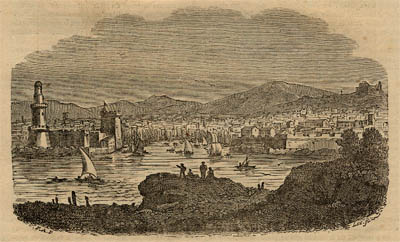
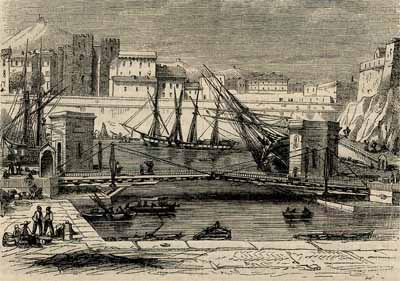
The above engraving shows the Abbaye de Saint-Victor and the dock for careening ships.
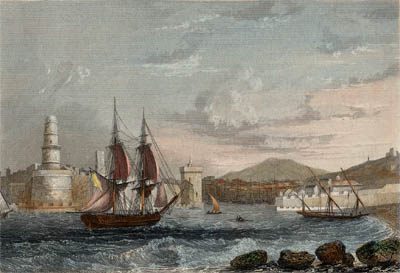
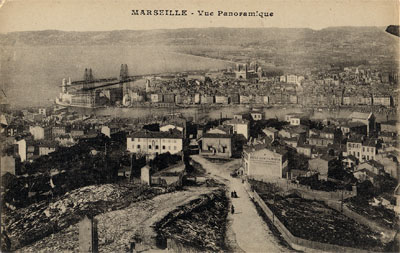
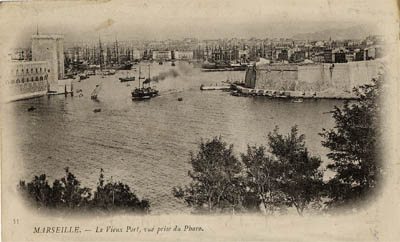
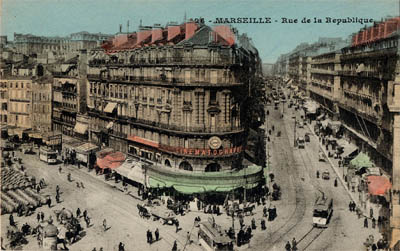
Built before the French Revolution, the original Grand Théâtre that Berlioz knew was inaugurated on 31 October 1787. In the early 19th century, it gave many performances of ballets and operas, featuring in particular the works of Meyerbeer and Halévy, but also of Liszt, then a young prodigy. At the time, the Théâtre (also known as Opéra de Marseille) made Marseille the second French city to have its own opera house, after Bordeaux.
The building was heavily damaged by fire in 1919 and only the imposing peristyle columns and the main walls survived. The almost reconstructed Opéra de Marseille was formally inaugurated in 1924 with Ernest Reyer’s opera, Sigurd. After the second World War it was renamed Opéra municipal de Marseille.
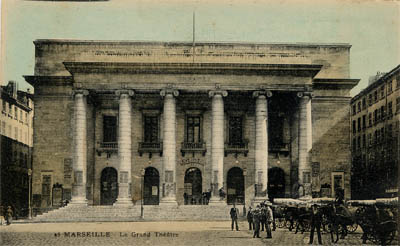
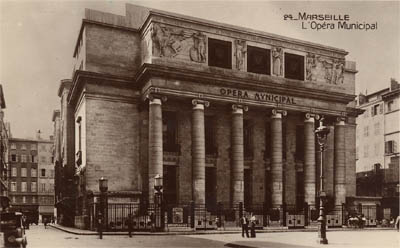
![]()
See also:
Berlioz and Marseille: friends and acquaintances
Auguste Morel: documents on his career (in French)
![]()
The Hector Berlioz Website was created by Monir Tayeb and Michel Austin on 18 July 1997;
Berlioz and Marseille page created on 11 December 2010. Revised on 1 August 2023.
© Monir Tayeb Michel Austin for all the pictures and information on this page.
Copyright notice: The texts, photos, images and musical scores on all pages of this site are covered by UK Law and International Law. All rights of publication or reproduction of this material in any form, including Web page use, are reserved. Their use without our explicit permission is illegal.